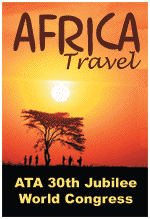|
.Author's
Bio
Letters
to Editor
Kenya
turns on the Magic
by
Jerry W. Bird

Minutes after our Kenya Airways jet
touched down at Nairobi International
Airport, following a cross-continent
flight from Cameroon - - we were Amboseli
bound. Spectacular sights on the route
south included a panoramic 'passing
parade,' with a backdrop of grassy fields
and rolling hills covered with a blanket
of lily white blossoms as far as the eye
could see. In the foreground, every few
miles stood Maasai herdsmen, alone or in
pairs. From nine year olds to great
grandfathers, they were guarding their
mixed herds of cattle, sheep and goats.
Clusters of wildlife mingled with the herd
as we drew nearer to the park gates. One
of the most enduring, endearing and
colorfully garbed of African tribes, the
Maasai culture has flourished since
earliest times. Directly south of Nairobi
in the shadow of the legendary, snowcapped
Mount Kilimanjaro,
Amboseli
National Park was first on our list of
Kenya's must-see attractions. The most
compelling reason is its large
concentrations and wide variety of
wildlife. Little time was wasted in
getting us out 'on Safari, " 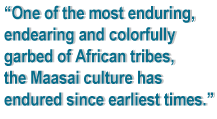 as
no sooner than we checked in at the
Amboseli Serena
Safari Lodge, like Dr. Doolittle, we were
off to see the animals. as
no sooner than we checked in at the
Amboseli Serena
Safari Lodge, like Dr. Doolittle, we were
off to see the animals.
The
first Safari stop was at a nearby Maasai
village, where we met and mingled with the
chief and villagers; visiting their
lodges, watching a fire-making
demonstration, capturing some unique
photos and bargaining for a seemingly
endless selection of craft items. We
ventured inside one of the dwellings, made
entirely of indigenous materials,
including dried elephant dung. This
mixture keeps the homes cool in summer and
protected from rain and biting winds in
winter, as it has for generations.
(see
blowup
map)
Before
I continue with our main Kenya Story and
the ATA 30th Jubilee in Nairobi, here is
some late news that is the most positive
we've heard in several years. The Kenya
Tourist Board (KTB) announced record
upsurges in tourism to Kenya from the U.S.
market. After three record months for
June, July and August, the KTB recorded a
74% increase of tourism over last year,
exceeding months that predate
9/11.
On
Safari:
At
one point during our evening game drive
from Serena's Amboseli Lodge, I was struck
by the fact that you could look in every
direction - 360 degrees -- and see some
form of wildlife. A family of elephants on
the horizon at 12 o'clock -- several
frisky giraffes to the right - a herd of
buffalo grazing on our left - and other
grassland creatures bringing up the rear.
George, our driver stopped for fifteen
minutes as we watched two large Crested
Cranes in attack mode. One was hopping
about, spreading his wings and hunching
his back defiantly as he approached a
cobra, which lay by the side of the road
totally unperturbed by all the cavorting
and saber rattling.
To
the reader: Further sections of our Kenya
tour are currently in the final stage of
editing and will be online shortly. The
following are excerpts from our notes,
whereas the final version will be in the
same day by day sequence as our
tour.
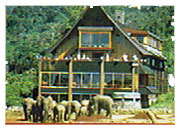 Wildlife
Haven in the Aberdares Wildlife
Haven in the Aberdares
We
arrived at the Ark Game Lodge before
dinner after a pleasant afternoon at the
Aberdare Country Club, a 45-minute drive
away. Aptly named, with reference to Noah,
the Ark is located in Aberdares National
Park, and seems to operate around the
clock, as it overlooks a floodlit water
hole. Being a salt lick , the area
attracts a passing parade of wildlife,
which seem to come in bunches, as if each
group was allotted its own time on stage.
For example, a horde of frisky baboons
might be followed by a family of
elephants, a herd of bushbuck, or a
combination of characters. The management
kept us informed by an en-suite buzzer
system if anything unusual was happening
at the water hole. Guests can watch the
action from one of three observation
decks. A bunker at ground level, offers
the photographers among us an unobstructed
view. The lodge, with its cabin style
rooms, reminds me of some of my favorite
hideaways in Northern Canada, and we felt
at home immediately. As expected, the food
in the dining room was outstanding, and I
later assumed a position by the large
stone fireplace. What a
life!
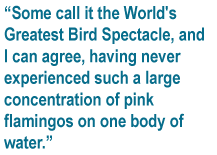 Lake
Nakuru - Birds and
Buffalo:
Approaching Lake Nakuru from the National
Park gates, I had little idea of the
unforgettable sight awaiting us. Some call
it the "World's Greatest Bird Spectacle,"
and I can agree, having never experienced
such a large concentration of pink
flamingos on one body of water. Since the
Lake Nakuru Lodge, our destination for the
day, was on the opposite shore, we circled
the lake and our driver soon discovered a
relatively dry area where we could motor
along the shore. We were soon positioned
in the midst of a sizable flock -- an
ideal photo op. Like a typical
beachcomber, I spotted a sun-bleached
buffalo skull lying in the sand, and by
the time our Lake
Nakuru - Birds and
Buffalo:
Approaching Lake Nakuru from the National
Park gates, I had little idea of the
unforgettable sight awaiting us. Some call
it the "World's Greatest Bird Spectacle,"
and I can agree, having never experienced
such a large concentration of pink
flamingos on one body of water. Since the
Lake Nakuru Lodge, our destination for the
day, was on the opposite shore, we circled
the lake and our driver soon discovered a
relatively dry area where we could motor
along the shore. We were soon positioned
in the midst of a sizable flock -- an
ideal photo op. Like a typical
beachcomber, I spotted a sun-bleached
buffalo skull lying in the sand, and by
the time our  photo
session began, one very large buffalo
presented himself directly in front of the
camera lens. In the background, like a
chorus line from the Follies, dozens of
white pelicans took center stage and began
their parade for the camera's waiting eye.
We discovered that the reason flamingos
are pink because their consumption of the
blue-green algae in the lakes. Lake Nakuru
Park is home to over 400 species of birds,
from the more numerous flamingos and
pelican, to herons, egrets, fish eagles,
grebes and more. (see
Birds of
Kenya) photo
session began, one very large buffalo
presented himself directly in front of the
camera lens. In the background, like a
chorus line from the Follies, dozens of
white pelicans took center stage and began
their parade for the camera's waiting eye.
We discovered that the reason flamingos
are pink because their consumption of the
blue-green algae in the lakes. Lake Nakuru
Park is home to over 400 species of birds,
from the more numerous flamingos and
pelican, to herons, egrets, fish eagles,
grebes and more. (see
Birds of
Kenya)
On
the Road
Again:
Early in life, being a Boy Scout brought
about my proudest moments, and each
proficiency badge I earned was cherished
like a purple heart. So heading north that
afternoon from Nairobi, as we passed
Nyeri, we learned that this beautiful
agricultural area was the final resting
place of Lord Baden-Powell, who founded
the Scout movement . Knowing this fact
brought a flood of gratitude for the great
man and his legacy. We need heroes and he
is one of mine. Our next trip's agenda
will include a visit Baden-Powell's grave
site, gardens and Paxtu cottage, which now
houses a museum in his honor.
Norfolk
Hotel
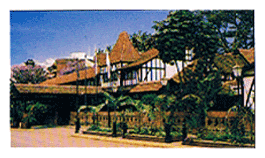 At
home in Nairobi's Historic Grand
Hotel At
home in Nairobi's Historic Grand
Hotel
Visiting Nairobi's Tudor style Norfolk
Hotel, now celebrating its
100th
Anniversary,
is like taking a journey into British
colonial history. Stopping for a
prearranged luncheon at this elegant
hotel, we were greeted like royalty and
seated at a pleasant, gardenside table
next to the main dining room, where we
later shared a few pleasant moments with
our host, Bunty, who filled us in on the
hotel's amazing story. Among the many
offerings on the noon buffet menu, was a
highly polished silver steamer, brimful
with king-size prawns. Only on rare
occasions do I take the time to photograph
a meal in progress, but this was for the
record. Another feast was presented on the
dining room walls, where a gallery of
black and white photographs portrays life
in Kenya from the 1800s through to the
1950s. We could have stayed the entire day
gazing at these unique images - and vow to
return.
See
NORFOLK 100TH
ANNIVERSARY
More Kenya Magic - Next
Page
Notes:
Amboseli lies immediately North West of
Mt. Kilimanjaro, on the border with
Tanzania. Amboseli was established as a
reserve in 1968 and gazetted as a National
Park in 1974. The Park covers 392 km2, and
forms part of the much larger 3,000 Km2
Amboseli ecosystem. Large concentrations
of wildlife occur here in the dry season,
making Amboseli a popular tourist
destination. It is surrounded by 6
communally owned group ranches. The
National Park embodies 5 main wildlife
habitats (open plains, acacia woodland,
rocky thorn bush country, swamps and
marshland) and covers part of a
Pleistocene lake basin, now dry. Within
this basin is a temporary lake, Lake
Amboseli, that floods during years of
heavy rainfall. Amboseli is
famous
The
Lodge: In harmony with nature, the
Amboseli Serena Safari Lodge, being
located in the center of Maasai territory,
reflect the tribe's colorful culture in
its architecture and interior design.
(more to come)
The
Crested Crane of Africa resembles a
peacock and flies in wedge shaped
formation during migration. Its animated
courtship dance involves bowing and
hopping about noisily while circling its
partner. The cranes we saw at Amboseli
performed a similar version to scare off,
or at least impress the
cobra.
|

 as
no sooner than we checked in at the
Amboseli Serena
Safari Lodge, like Dr. Doolittle, we were
off to see the animals.
as
no sooner than we checked in at the
Amboseli Serena
Safari Lodge, like Dr. Doolittle, we were
off to see the animals.  Wildlife
Haven in the Aberdares
Wildlife
Haven in the Aberdares Lake
Nakuru - Birds and
Buffalo:
Approaching Lake Nakuru from the National
Park gates, I had little idea of the
unforgettable sight awaiting us. Some call
it the "World's Greatest Bird Spectacle,"
and I can agree, having never experienced
such a large concentration of pink
flamingos on one body of water. Since the
Lake Nakuru Lodge, our destination for the
day, was on the opposite shore, we circled
the lake and our driver soon discovered a
relatively dry area where we could motor
along the shore. We were soon positioned
in the midst of a sizable flock -- an
ideal photo op. Like a typical
beachcomber, I spotted a sun-bleached
buffalo skull lying in the sand, and by
the time our
Lake
Nakuru - Birds and
Buffalo:
Approaching Lake Nakuru from the National
Park gates, I had little idea of the
unforgettable sight awaiting us. Some call
it the "World's Greatest Bird Spectacle,"
and I can agree, having never experienced
such a large concentration of pink
flamingos on one body of water. Since the
Lake Nakuru Lodge, our destination for the
day, was on the opposite shore, we circled
the lake and our driver soon discovered a
relatively dry area where we could motor
along the shore. We were soon positioned
in the midst of a sizable flock -- an
ideal photo op. Like a typical
beachcomber, I spotted a sun-bleached
buffalo skull lying in the sand, and by
the time our  photo
session began, one very large buffalo
presented himself directly in front of the
camera lens. In the background, like a
chorus line from the Follies, dozens of
white pelicans took center stage and began
their parade for the camera's waiting eye.
We discovered that the reason flamingos
are pink because their consumption of the
blue-green algae in the lakes. Lake Nakuru
Park is home to over 400 species of birds,
from the more numerous flamingos and
pelican, to herons, egrets, fish eagles,
grebes and more. (see
Birds of
Kenya)
photo
session began, one very large buffalo
presented himself directly in front of the
camera lens. In the background, like a
chorus line from the Follies, dozens of
white pelicans took center stage and began
their parade for the camera's waiting eye.
We discovered that the reason flamingos
are pink because their consumption of the
blue-green algae in the lakes. Lake Nakuru
Park is home to over 400 species of birds,
from the more numerous flamingos and
pelican, to herons, egrets, fish eagles,
grebes and more. (see
Birds of
Kenya) At
home in Nairobi's Historic Grand
Hotel
At
home in Nairobi's Historic Grand
Hotel![]()

